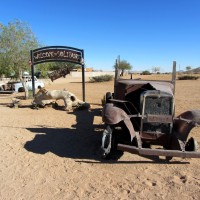I recently went to take care of my mother after she had hip replacement surgery. Not knowing quite what to expect I, was a little worried beforehand whether I would be able to cope. I suffer with chronic migraines and some days struggle to just take care of myself. Luckily, I was coming into the situation three weeks after the operation. My mother had been in hospital for a week, in “rehab” for a week, and had had a week at home with a live-in home-care nurse. I also knew I was going to have the support of my mother’s doctor, a physiotherapist and the home-care nurse (should her services be required).
My “duties” ended up being very varied. Everything from helping my mother bathe, changing dressings and generally helping her get around the house on her walker/crutches, getting up with her during the night if she needed help. To cooking meals, doing laundry, running errands, going shopping, walking the dog and helping her entertain friends that came by. Even though it didn’t feel like I was that busy, living somebody else’s life turned out to be exhausting! My box of toys (books, computer etc) remained mainly untouched, as any free time was spent sleeping.
During the time I was there, I realized several things about taking care of a post-op patient.
It takes a village
Well, maybe not a village, but a group of kind and helpful friends and neighbours (and family if they live close by). In my mother’s case (not having any family in the country besides me), her friends have become her family. And they are great – helping in practical ways, but also providing a lot of moral support. Every day several people come by or phone to find out how it is going, and whether there is anything they can do. And they mean it. Even neighbours with whom my mother has little social contact, come by and offer help. They continued to do this even after I arrived. For me as a caregiver it was wonderful to know that we had that kind of support. There was no formal “duty roster”, but somehow somebody was always available when they were needed.
Ask for and accept help
This applies to both the patient and the caregiver.My mother has lived on her own since my father died over 11 years ago. She’s fiercely independent and has always coped well on her own. This situation was so different though. During the first couple of weeks in hospital and rehab, she needed 24/7 professional nursing care. But after that she still had to ask people to do the simplest things for her – which was very difficult for her to get her head around initially and caused some depression.
As a caregiver, I also had to give up the notion that I could do it all. Or even that I was expected to do it all on my own. So we both ended up having to ask for and accept help.
Random acts of kindness mean a lot
Helping somebody who has had an operation doesn’t have to be a huge time commitment. My mother’s friends and neighbours did a variety of things which meant a lot to her, but was relatively simple for them to do. Some examples were:
Taking a plate of food to the patient. What a great idea! Sick people who live alone generally don’t need a whole lot of food, but dishing up an extra plate of food at a mealtime and quickly delivering it, works great. I ended up not having to do much cooking, because friends were still supplying food after I arrived.
Offering to take her dog for a walk. Ben, the dog, now has a number of dog walkers who take turns to walk with him. He gets very excited when any of them come to visit, and immediately assumes that they must be there for him!
Running a simple errand. Doing some shopping for basics, fetching medication from the pharmacy, helping the patient get to a doctor’s appointment, going to the library to get some new reading material. None of them huge favours on their own, but collectively they make a huge difference to somebody who can’t do any of them for themselves.
Baking a batch of cookies. My mother likes offering her guests homemade baked goods, so with the constant stream of visitors coming around, cookies were needed! And very kindly baked by a friend.
Coming around and reading articles from newspaper or a chapter or two from a book. My mother found it difficult to hold and read a big newspaper while lying in bed, but she loves to know what is happening in the news. Reading to somebody doesn’t only impart information, it’s a form of keeping somebody company, without the need for them to respond and hold up their end of the conversation.
Patience and a sense of humour help
Again something that applies to both patient and caregiver. For somebody who has always had fairly good health, having an operation, being in severe pain and dependent on others is very difficult to cope with. Dealing with any additional setbacks can be very depressing and demoralizing. My mother has never been a patient person, so she’s had to work at this. Finding the humour in bad situations definitely helps lift the mood of both patient and caregiver.
For the caregiver, it’s a matter of putting aside your own ideas about how things should work, and helping the patient to get through each day as well as possible. At the 3-week post-op point it was time for my mother to use her crutches to do some walking. Instead of going for a walk down the road, we planned outings like going shopping at the newly opened supermarket in town. My mother loves shopping, I hate it. It turned out to be a character building experience for me! While my mother moved very slowly up and down the aisles, I pushed the trolley and loaded in the groceries she wanted. It would have been much quicker if I had done the shopping on my own, but my mother’s joy at accomplishing something on her own two feet for the first time in weeks, made it worth it.
Pets are really important
There’s nothing like a dog or cat keeping one company to lift the spirits. Once she was home again Ben (my mother’s dog), followed her around like a shadow. If he wasn’t being taken for walk, he was lying next to my mother’s bed or at her feet when she sat in a chair.
Ben also helped me meet people in the little town. He’s a well known dog, since my mother has always taken him everywhere she goes. So every time I went walking with him, people would stop me with the question “Is this Ben?” and then they would introduce themselves and ask after my mother. I’ve never met so many new people in such a short time!

Ben, the dog - faithful companion, enthusiastic walking buddy, and social introduction agent. ©LB/notesfromafrica.wordpress.com


















Great lessons to learn. What a world it wold be if we put kindness to others first. Ben looks like a sweet dog.
Thanks for reading the post and leaving a comment. Yes, just a little kindness goes a long day. Ben is a quiet, gentle dog.
Ben looks so sweet. I recently got a companion dog and she also comes everywhere with me – I have made many new acquaintances through her. I hope your Mom recovers well.
Your dog is beautiful! I have always been more of a cat person, but in recent years have come to appreciate dogs as well. I also take our dog (Rosie) with me whenever I can.
Thanks, my mother is doing very well. After a couple of initial set-backs she’s improving steadily now, and walks very well on crutches.
Good to know you got along okay during your time away and your mother is recovering well. I don’t know that I would have the patience to do what you did. I’d like to think I would, but it would be hard, for sure. Ben is a cutie, but I bet your glad to be home with Rosie again.
Kathy
The role of caregiver was much easier than I thought it would be. I have to say though that the patient had a good attitude (re: doing her exercises and not doing anything dangerous) while I was there. I think people (including myself) were happy to help, because she appreciated everything we did for her.
The positive effect they have on the sick and infirm is quite a testimony to the “wonderfulness” of animals, and cats and dogs in particular. continue…
I agree! I’m often not feeling well, and having my two animals (a cat and dog) close to me, is such a comfort. I really missed them when I was away. Ben, is a nice dog, but his attention was focused very much on my mother.
Good post, lots of good observations and advice. And I think Ben definitely deserved some recognition. 🙂
Thanks Mike! Yes, Ben is a caregiver in his own way. He is very camera shy though, and I really had to work at it to get a nice photo of him.
I think you did a great job. And thanks for sharing what you learnt. It will definitely help someone else in the same situation.
Thanks Sarita! I appreciate your comment even more because I know you’ve been in the same situation. And you did it alone, without much assistance. I had it easy in comparison.
Interesting post – made all the more interesting when one knows the patient and the care-giver!
Ha, I was wondering if you would get around to reading this post! It was a surprisingly positive experience for all involved. “The patient” is continuing to improve daily. She has an added incentive – that if she’s fully mobile by the end of November she can come and visit me!
It’s very good advice you offered about asking for and accepting help. That’s an important lesson for all of us – even if we’re not bedridden.
I’m glad that your mom is improving and has such a wonderful support network to rely on.
She has a lovely companion in little Ben. He is the best medicine of all!
I think a lot of people struggle to ask for help. It’s generally seen as a sign of weakness. How did your mother cope when she first had her injury? I remember that you also went to help her. How is she doing now?
Ben is doing my mother the world of good. The first to weeks when she was away from home, she obviously couldn’t have him with her and she missed him a lot.
Great post- I think you are so right. I hope she`s quickly on the mend.
Hope your mum is on a speedy road to recovery 🙂
She’s doing well, thank you! Is now walking on one crutch.